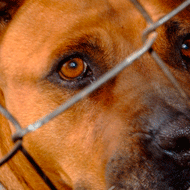Appeal for information on dog fighting

A reward of up to £5,000 is being offered for any information that could lead to a successful prosecution. (stock photo)
The League Against Cruel Sports (LACS) is appealing for information after the bodies of three dogs bearing signs of dog fighting were found in Bedfordshire.
Two of the dogs had cropped ears, an illegal practice used to make fighting dogs look more aggressive. Meanwhile, the teeth of one of the dogs had been filed down, suggesting it had been used as a ‘bait’ dog to spar with more powerful dogs.
All three dogs had been imported into the country and had foreign microchips. Two are thought to be Presa Canario dogs, while the third was a bull breed. Their ‘mutilated’ bodies were found in the Cranfield Road area near Cranfield village, after the charity received a tip-off.
A reward of up to £5,000 is being offered for any information that could lead to a successful prosecution. LACS is aiming to find out who owned the dogs and the location of any suspected dog fights.
Dog fighting was banned in 1835 but remains a significant animal welfare issue in the UK.
LACS campaigns director Chris Luffingham said: “Dogs involved in dog fighting suffer terrible injuries, both in the fights themselves and at the hands of their vicious owners. Most will die in the ring or soon after from their injuries. Others that can no longer fight are often brutally dispatched.
“The League is determined to stamp out dog fighting in this country and we ‘re asking for the public’s help to achieve this. We need to bring an end to the untold suffering dog fighting inflicts on man’s best friend.”
LACS is asking anyone with any information to contact its Animal Crimewatch team on 01483 361108, or email crimewatch@league.org.uk



 The latest
The latest